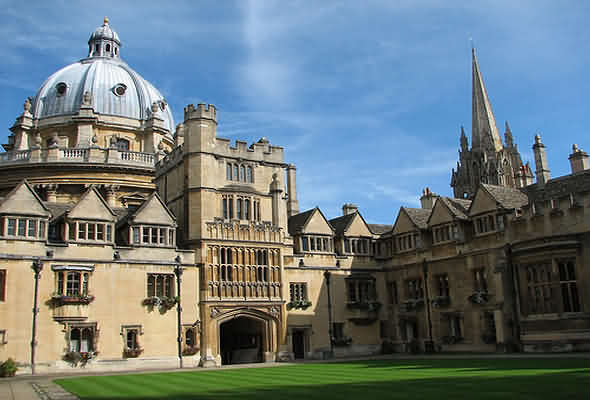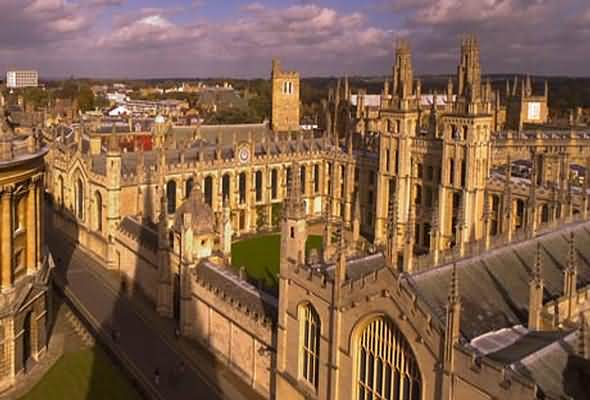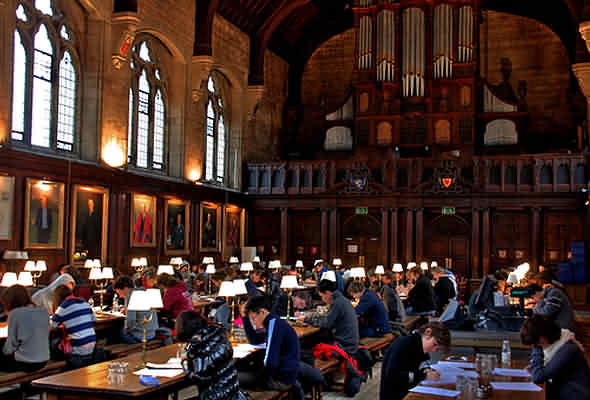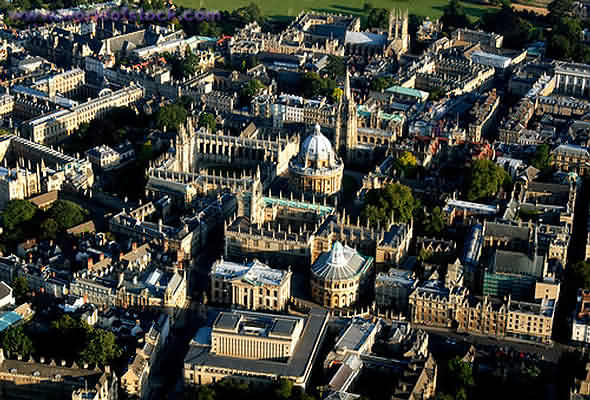 |
| The Local Time is Saturday, 27-Jul-2024 07:01:59 CEST |
Oxford University & Colleges |
|
|||
| YOU ARE HERE: Main Home Page > Places to Visit > Oxford > Oxford University |
|
|
 |
|
 The King's Hall and College of Brasenose is situated in Radcliffe Square  The College of All Souls of the Faithful Departed was founded by King Henry VI and Henry Chichele  Balliol College, Broadstreet, Oxford  Aerial View of Oxford Colleges Location Map of Oxford Colleges |
||||||||||||||||||||||||||||||||||||||||||||||||||||||||
|
||||||||||||||||||||||||||||||||||||||||||||||||||||||||
|
||||||||||||||||||||||||||||||||||||||||||||||||||||||||
The Colleges and Private Halls of Oxford University
The University of Oxford has 38 Colleges and 6 Permanent Private Halls of religious foundation. Colleges and Permanent Private Halls are autonomous self-governing corporations within the university, and all teaching staff and students studying for a degree of the university must belong to one of the colleges or Permanent Private Halls. These colleges are not only houses of residence, but have substantial responsibility for student teaching. Generally tutorials (one of the main methods of teaching in Oxford) and classes are the responsibility of colleges, while lectures, examinations, laboratories and the central library are run by the university. Most colleges take both graduates and undergraduates, but several are for graduates only. Undergraduate and graduate students may name preferred colleges in their applications. For undergraduate students, an increasing number of departments practise reallocation to ensure that the ratios between potential students and subject places available at each college are as uniform as possible. For the Department of Physics, reallocation is done on a random basis after a shortlist of candidates is drawn upon and before candidates are invited for interviews at the university. A typical college consists of a hall for dining, a chapel, a library, a college bar, senior, middle (postgraduate) and junior common rooms, rooms for 200-400 undergraduates as well as lodgings for the head of the college and other dons. College buildings range from the medieval to very modern buildings, but most are made up of interlinked quadrangles (courtyards), with a lodge controlling entry from the outside. 2008 saw the first modern merger of colleges, with Green College and Templeton College merging to form Green Templeton College. This reduced the number of Colleges of the University from 39 to 38. The number of PPHs also reduced in 2008, when Greyfriars closed down. List of Colleges and Date of FoundationAll Souls College - 1438; Balliol College - 1263; Brasenose College - 1509; List of Permanent Private HallsBlackfriars - 1221, refounded 1921; Campion Hall - 1896; University ToursOxford University does not run tours, although many University and College buildings are open to visitors.
About Oxford CollegesHere you will find summary information about the Colleges of Oxford University and their history. For more information see - Oxford University College Visits. All Souls College- High Street, Oxford, OX1 4ALThe College of All Souls of the Faithful Departed, of Oxford, was founded by Henry VI and Henry Chichele (fellow of New College and Archbishop of Canterbury), in 1438. Today the College is primarily an academic research institution with particular strengths in the Humanities and Social and Theoretical Sciences and an outstanding library. It also has strong ties to public life. Although its fellows are involved in teaching and supervision of research, there are no undergraduate members. Balliol College- Broad Street, Oxford, OX1 3BJBalliol is the oldest of the colleges being founded in 1263 and is one of Oxford’s best known Colleges. It has a world-wide reputation for its long history of academic excellence. It is informal, friendly and diverse, encouraging students from all kinds of backgrounds and many nationalities. Balliol is renowned for producing Prime Ministers (Herbert Asquith, Harold Macmillan, and Edward Heath), as well as literary figures (Robert Southey, Matthew Arnold, Algernon Swinburne, Gerard Manley Hopkins, Hilaire Belloc, Aldous Huxley, Nevil Shute, Anthony Powell, Graham Greene, Robertson Davies, and Robert Browning). Four Nobel-prize winning scientists studied here: Oliver Smithies, C.N. Hinshelwood, Baruch Blumberg, and Anthony Leggett. John Wycliffe, who inspired the first translations of the Latin Bible into English, was one of the College's Masters in the fourteenth century. Adam Smith, of The Wealth of Nations fame, was here from 1740-1746. In the twentieth century Balliol man William Beveridge led the development of modern social welfare. More recent well-known alumni have included Paul Almond, Richard Dawkins, Peter Snow, Bill Drayton, Christopher Hitchens, Cressida Dick, Nicola Horlick, Robert Peston, Boris Johnson, Yvette Cooper, Stephanie Flanders, Amit Chaudhuri, Rana Dasgupta, and Dan Snow. Brasenose College - Radcliffe Square, Oxford, OX1 4AJThe King's Hall and College of Brasenose is situated in Radcliffe Square in the very heart of the University. Brasenose College, situated in the centre of Oxford and overlooking one of the world's most beautiful squares. One of the older colleges of the University of Oxford, Brasenose celebrated its 500th anniversary in 2009. Brasenose is a friendly and informal community with a strong tradition of academic excellence. The College prides itself on the quality of its teaching and the expertise of its fellows and lecturers. Brasenose also offers a wide range of cultural, social and sporting activities. David Cameron the current Prime Minister of the UK studied for his Bachelor of Arts degree here and graduated in 1988 with a first class honours degree (MA). Christ Church College - St. Aldates, Oxford, OX1 1DPChrist Church is a unique institution, one of the largest colleges in the University of Oxford and the Cathedral Church for the Diocese of Oxford. It has a world famous Cathedral Choir; scholarly collections of books and art; and is enjoyed by many people as visitors or guests at conferences and Summer schools. Christ Church has a fascinating history and many distinguished people have studied here including John Locke, Robert Hooke, John Wesley, Robert Peel, William Gladstone, W.H. Auden, David Dimbleby, Rowan Williams, Richard Curtis, Howard Goodall, and Charles Lutwidge Dodgson (Lewis Carroll). Harry Potter's Hogwarts school themes were filmed here. Hertford College - Catte Street, Oxford, OX1 3BWMany Oxford colleges can trace an unbroken corporate history back over the centuries. Hertford both is, and is not, part of this ancient tradition, being the heir of the medieval Hart Hall, a failed eighteenth century college, Hertford College, and the annexation in the early nineteenth century of that college’s site and assets by another former medieval foundation, Magdalen Hall. The present college dates from 1874 when Magdalen Hall was dissolved and incorporated as the new Hertford College. The complex history of Hertford is reflected in the contrasting experiences of its more notorious or famous old members, who include, from Hart Hall and the first Hertford, the Roman Catholic Jesuit martyr Alexander Briant, the poet John Donne, the legal historian John Selden, the satirist Jonathan Swift, Henry Pelham, Prime Minister 1743-54 and the Whig statesman Charles James Fox; and from Magdalen Hall, in addition to Hobbes and Wilkins, William Tyndale, translator of the Bible, and Edward Hyde, earl of Clarendon, first minister to Charles II (1660-67). As well as the usual slew of academics, clerics, lawyers, writers and politicians, among the more notable members of the new Hertford College could be listed the philosopher and writer Alain Locke, the first African American Rhodes Scholar who was admitted to read classics at Hertford (1907-10) after other Oxford colleges had refused him entry because of his race; the novelist Evelyn Waugh; James Meade, fellow 1931-7 and Nobel Laureate for Economics and Dom Mintoff, Prime Minister of Malta (1955-8 and 1971-84). Magdalen College - High Street, Oxford, OX1 4AUMagdalen College was founded in 1458 by William Waynflete, Bishop of Winchester, and Lord Chancellor, on the site of the Hospital of St. John, just outside Oxford’s East Gate. Magdalen provides some of the most picturesque sights in Oxford, with buildings that span its 550 years of rich and eventful history have left Magdalen with some of the most picturesque sights in Oxford, not forgetting the award winning gardens, making it a must-see for the Oxford visitor. Yet the College is so much more than a mere collection of splendid buildings and inspiring gardens that have survived the test of time. It has been a place of study and inspiration for no fewer than nine Nobel prize winners and several other famous alumni, under the leadership of 42 presidents. The College remains a vibrant place that is constantly enriched by student and academic life, by its unique choral and musical tradition, and by the numerous societies and sporting activities of its members. John Betjeman (poet) studied at this college. Exeter College - Turl Street, Oxford, OX1 3DPIn the heart of Oxford since 1314, opposite the Bodleian Library, Exeter College is strongly committed to excellence in teaching and research, offers generous hardship and research support, graduate scholarships, a library open round the clock and an in-house careers and internship programme. The academics at Exeter College explore a diverse range of topics drawn from a wide range of fields of study. The College has earned a reputation for being a place of outstanding learning and outstanding research, as our fellows and lecturers are some of the foremost thinkers in their respective fields. William Morris studied here. At Exeter College J R R Tolkien studied English Language and Literature, graduating in 1915 with first-class honours in his final examinations. He wrote The Hobbit and the first two volumes of Lord of the Rings whilst professor at Pembroke College. See Tolkien connections with the Cotswold town of Morton-in-the-Marsh. Nuffield College - New Road Oxford OX1 1NFNuffield is a graduate college of the University of Oxford specialising in the Social Sciences, particularly Economics, Politics, and Sociology. It aims to provide a stimulating research-orientated environment for postgraduate students (about 75 in number) and faculty (approximately 60 academic fellows of the College). Nuffield College, which was founded in 1937 by William Richard Morris, is located in the centre of Oxford. Around a third of Nuffield's fellows hold appointments at the University of Oxford as lecturers, readers or professors. In addition the College fully funds around a dozen Official Fellowships, which the College views as tenured research professorships (although most also teach on the University's graduate programme), and about a dozen three year post-doctoral research fellows. The College also houses a number of young scholars who hold distinguished awards, such as British Academy post-doctoral fellowships, some senior research fellows and a group of research active emeritus & honourary fellows. The College has been - and continues to be - the source of some of the major research developments in social science. These include the British Election Studies and the major programme of research on Social Mobility in Britain. It was the birthplace of the "Oxford School" of Industrial Relations; it pioneered the development of cost benefit analysis for developing countries; and it has made a major contribution to the methodology of econometrics. University CollegeThe oldest college in Oxford or Cambridge. University College owes its origins to William of Durham, who died in 1249. Bill Clinton, ex-president of USA attended this college. Other former students include - C. S. Lewis, theologian and writer of the Narnia books and Harold Wilson, Prime Minister of Great Britain; More of the CollegesWe shall be adding details of more colleges to this page over the course of the next several weeks. |
||||||||||||||||||||||||||||||||||||||||||||||||||||||||
|
||||||||||||||||||||||||||||||||||||||||||||||||||||||||
| BACK TO TOP | ||||||||||||||||||||||||||||||||||||||||||||||||||||||||
Oxford University & Colleges |
||||||||||||||||||||||||||||||||||||||||||||||||||||||||
| This page last modified Friday, 12-Mar-2021 15:07:09 CET | ||||||||||||||||||||||||||||||||||||||||||||||||||||||||





